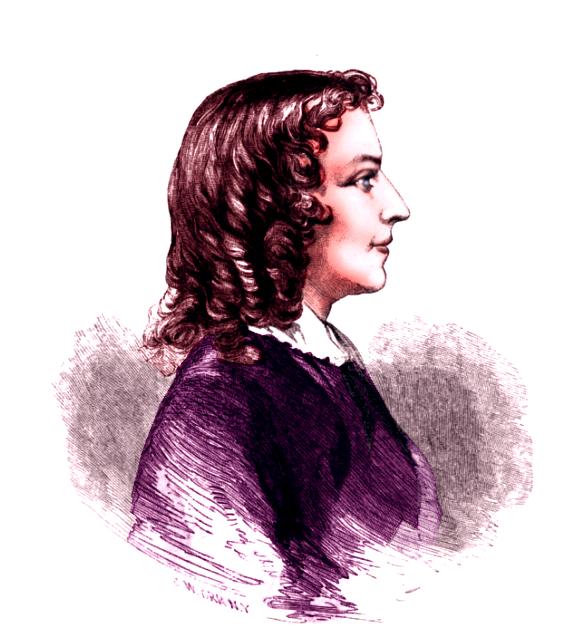|
Later Years
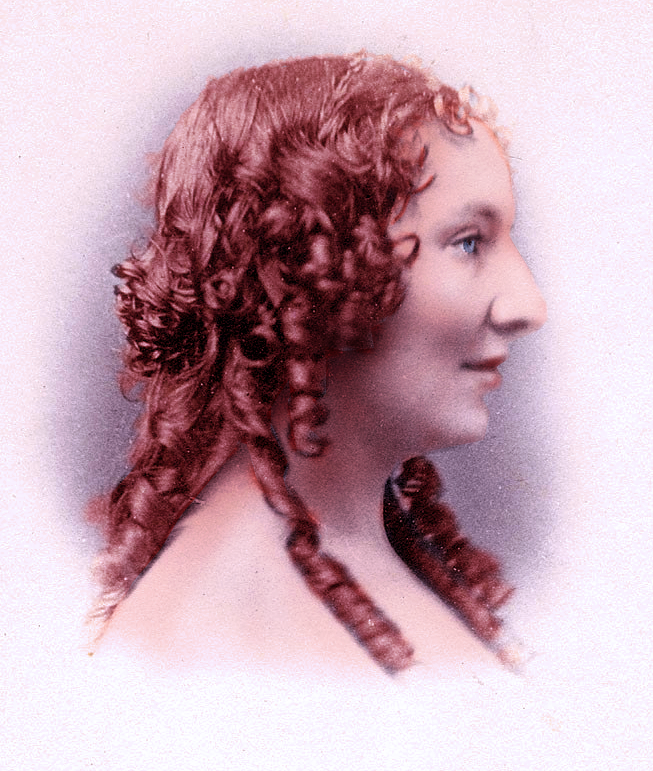
|
On June
7, 1854, Anna Cora married William Foushee Ritchie in an elaborate
Richmond wedding. Two thousand invitations were issued. Among the
invited guests were the President of the United States (Franklin
Pierce), his cabinet, and a large number of the members of the Congress
and of the Virginia Legislature.
The New York Times
titled their coverage of the ceremony a "Fashionable and Elegant Fete"
and declared it, "the most elegantly dressed, and in other respects,
distinguished which has been brought together for many a day." They go
on to mention the presence of Senator Stephen A. Douglas along with
what they estimated to be five or six hundred other guests.
The bride, the reported wore a "dress
of superb white silk, inlaid with lace, deeply flounced, and a long
bridal veil of costly thread lace, secured by a white myrtle wreath."
The writer declared the total effect to be "altogether exquisite,
without sacrificing simplicity to extravagance."
During
her years of marriage to Ritchie, Anna Cora became involved in the
movement to preserve George Washington's home at Mount Vernon as a
national historic site. She also wrote two fictional novels based on
her experiences in the theatre. Mimic Life; or, Before and
Behind the Curtain (actually three novellas collected in one
volume) was published in 1855 and Twin Roses; a Narrative
in 1857.
|
| Mimic Life is Mowatt's autobiography in fictional form. The
first story, "Stella," parallels Mowatt's own debut as an actress.
Other incidents in "The Unknown Tragedian" and "The Prompter's
Daughter" echo anecdotes Mowatt relates in her Autobiography. The book
gives an invaluable backstage view of theatre life in the early
nineteenth century. |
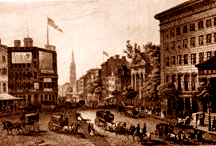
|
Mowatt
described the duties of the licensed puffer of the theatre, the purpose
of the assemblies of actors in the green-room, the role of the
prompter, and the shabbiness of typical backstage quarters. Mowatt gave
descriptions of the preparations her heroines take to play roles she
herself enacted such as Desdemona, Virginia, and Evadne that give
insight into what Mowatt's acting must have been like. Although
Mowatt's heroines endure much tragedy, Mimic Life
is hilarious reading in spots such as the following describing my
favorite Mowatt character, the disaster-prone Mrs. Pottle, in an
incident happening in days when actors were required to supply their
own costumes:
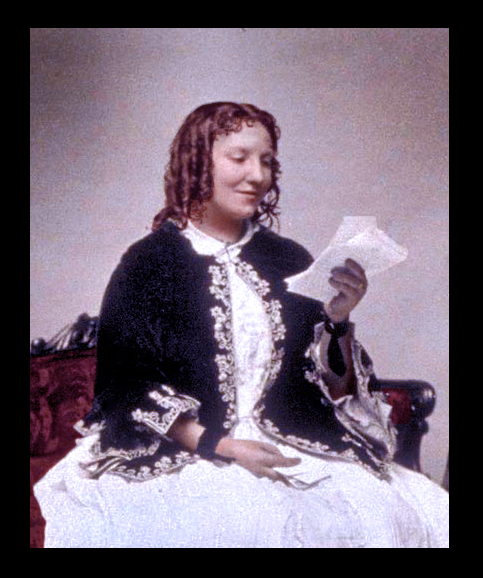
|
Mrs.
Pottle next strutted on the stage. Her stunted, shrivelled-up figure
was almost concealed in the folds of her far-spreading train, fashioned
in flame-colored cotton velvet. She had prodigally adorned her
diminutive head with a huge crown, cut out of foil. It was of her own
tasteful manufacture, and being somewhat limp in construction, shook
and rattled at every movement. Such a peal of laughter as broke from
the audience when she turned to them her wizened face! Mrs. Pottle had
been occupying her leisure moments in the green-room in the laudable
pursuit of plain sewing. She chanced, at the moment when Fisk made his
call, to be more deeply engrossed by her housewifely avocation than her
professional triumphs. The queen had pompously stalked upon the stage
without removing the spectacles, which glittered just beneath her
gilt-paper crown. The hand which she lifted to give point to her
declamation showed one finger armed with a shining brass thimble. The
unconscious Pottle smiled benignly; and, when the diversion of the
audience found vent in mocking applause, she curtseyed in the style in
which she thought queens were wont to curtsey. It may be well to state
that her conception of royalty was chiefly derived from the right regal
dame chronicled in "Mother Goose" as diverting herself in the kitchen
with the consumption of bread and honey.
Some
individual in the gallery waggishly inquired whether her royal majesty
had quite repaired the aperture in her royal consort's stocking. Mrs.
Pottle's attention was consequently attracted to her thimble. She
plucked the tell-tale armor, and hunted for a pocket; but pocket to her
newly-made queenly garment there was none. She clutched at her
spectacles; they were entangled in her hair, but, after, a several
furious pulls, gave way, dislodging the wonderful crown. It sent forth
a tinsel sound, as it lightly dropped on stage. The merriment of the
audience now reached its height. Mrs. Pottle was decidedly crestfallen.
|
Mimic
Life is, if nothing else, a marvelous document of nineteenth
century American theatre. Twin Roses started as a story Mowatt intended to include in Mimic
Life. She expanded it to novel
length. It is the story of the misfortunes of the twin sisters Jessie
and Jeanie Garnett. Both fall in love with actor Herman Landor. The
book is much the same in tone and character as Mimic Life.
Along with the chronicling the twins' misadventures, Mowatt continued
her fight to expose and nullify theatrical prejudice in passages like
the following:
In
Virginia, a canon of the church prohibits its members from attending
dramatic representations. Thus the acted drama seemed placed without
the pale of good. [Jessie] knew nothing of the arguments which might be
used in extenuation of so narrow an edict. Much that to her seemed the
growth of bigotry did not deserve a name so solemnly harsh. Traditional
prejudice -- the excitement produced by the burning of a theater
(1811), in which many valuable lives were lost -- perhaps some abuses
of the theatre itself, and a want of desire, or power, to suppress
them, on the part of the public -- these causes might have furnished a
fitter appellation for the source whence the edict emanated.
In both Twin
Roses and Mimic Life,
Mowatt created sympathetic characters who suffer as a result of
prejudice against the theatre.
In Mowatt's real life, things were not going well.
Although biographer Marius Blesi vigorously denies problems in the
Ritchie marriage, Anna Cora left her Richmond home never to return in
1860. She originally traveled to be with her ailing father, who died on
April 5, 1860. On August 25, 1860, she sailed for Europe without
William Foushee to visit one of her sisters who was also ailing. In Lady
of Fashion, biographer Eric Barnes speculated that there
might have been a difference of opinion on the issues of slavery and
states rights between the Ritchies and hinted that William Foushee
might have had a black mistress.
|
|
Anna Cora Mowatt Ritchie, circa 1854
|
|
Regardless of what the domestic
situation was between the two, the outbreak of the Civil War
effectively discouraged Anna Cora's potential return to Virginia. She
lived in Paris from 1861-63. From there, she published The Mute
Singer, A Novel in 1861.
The Mute
Singer is the story of Sylvie de la Roche. Like the
characters of Mimic Life, Sylvie is also a performer, but this
time a singer rather than an actress. She is the daughter of extremely
poor parents who do not recognize her talent, but is taken under the
wing of their neighbor Maitre Beaujeau, a gruff old music teacher. He
takes Sylive on as a pupil and secures her an opportunity to sing at
the home of a rich count. She is a tremendous success, especially with
young Marquis and Mademoiselle de St. Amar. Sylvie and the Marquis
immediately fall in love, but she dares not hope to marry a man with
such a high social position.
The
count's concert master hires Sylvie, but the strains of rehearsals and
excitement of performances cause her health to fail and she has a
nervous breakdown. She recovers her health but seems to have
permanently lost her voice. When her father is injured one day a few
miserable weeks later, Sylvie, in a moment of panic, regains her
singing, but not her speaking voice. Hence she becomes a mute singer.
After much turmoil and melodramatic misunderstandings, Sylvie marries
the Marquis and almost everyone lives happily ever after.
|
The Mute
Singer was
originally published in serial form in The New
York Ledger. The story ran on
the first page of the weekly issue of this publication from January 26,
1861, through March 30, 1861. It was evidently quite popular. Editor
Robert Bonner bragged in an April 13, 1861, editorial that Empress
Eugenie was among the novel's entranced readers:
We
learn, through a private letter from Paris, that on a recent occasion,
while the maids of Eugenie were preparing her toilette prior to her
going to a grand ball, she amused herself with reading Mrs. Ritchie's
story of "The Mute Singer" in the LEDGER. So absorbed did the Empress
become in this fascinating story that she continued to read on after
the maids had finished their work, without noticing that the hour had
passed when she was to notify the Emperor of her readiness to depart.
Napoleon, meanwhile, grew impatient at the delay, and finally sent his
chamberlain to notify the Empress that he was "awaiting her pleasure"
whereby she was recalled to herself, and bade "The Mute Singer" goodbye
until she should return.
Whether
or not the story actually found its way into the boudoir of the French
Empress, it did enter many American homes. Robert Bonner claimed that
in 1861 the Ledger made more money than any other
American newspaper.
Anna
Cora moved to Florence in 1863, where she produced Fairy
Fingers, A Novel in 1865. The book is a novelization of Eugene Scribe's 1858 play Les Doigts de fee. Fairy Fingers tells the story of a poor orphan of aristocratic stock who
falls in love with a count's son. After a series of misunderstandings,
she flees to America and opens a dress shop that quickly becomes the
talk of Washington society due to her great skill at sewing. The count
and his family visit America on business. They encounter Madelaine
again when she is hired to make a ball gown for the daughter of the
family. Other complications ensue, but through various acts of selfless
heroism, Madelaine wins the approval of the count and countess. The
family is reconciled; the complications are resolved; and the young
lovers marry.
Mowatt's novel is a good deal more comic than Scribe's play. Part of how she achieves this
effect is by adding an army of minor characters who make small
contributions to the plot, but are who are mined for their humorous appeal.
A good example of this strategy is Bertha’s uncle, Marquis de
Merrivale. Invented for the novel, this dotty aristocrat is focused
entirely on eating. He interprets the world around him — and the
motivations of all humanity — based on digestion.
In a way that Scribe's text does not, Mowatt
used the story of Madelaine the seamstress to comment on issues of
health, the status of women, and the trials of working women. To
Mowatt, on her own at this time and forced to be financially
independent, these were all issues of crucial importance.
|
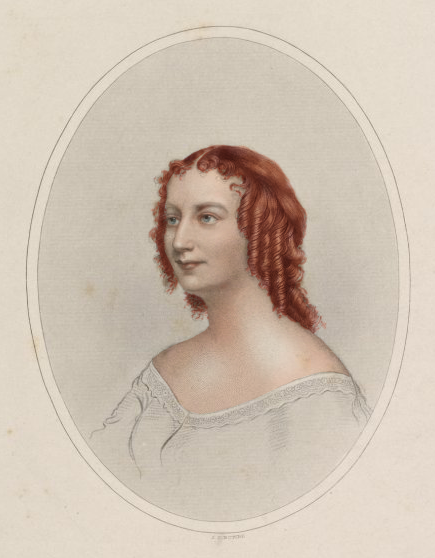
|
The
Civil War deprived William Foushee of his fortune and primary means of
income. Rather than returning to him in 1865, Anna Cora moved to
England, hoping to resume her stage career. The damp climate brought on
another attack of her chronic respiratory illness. She lived as an
invalid, maintaining a meager income by selling articles on the London
scene to American journals. Despite the longevity and severity of her
illness, neither her husband nor any of her relatives were present when
she died. Her old friend Epes Sargent was among the last people to
visit her. He wrote:
I
saw her two days before her death, and never did I witness such
perfect, cheerful tranquillity as she manifested. In that supreme
moment, when death seemed to have his hand on her, her thoughts and
conversation were all of others, not once of herself.
Anna Cora Ogden
Mowatt Ritchie died in Twickenham, England, on July 21, 1870. She was
fifty-one years old. Her body was buried in Kensall Green Cemetery in
London with her first husband, James Mowatt.

Back to Index Page
Hosted
by Alpha Centauri 2 Forums
|



